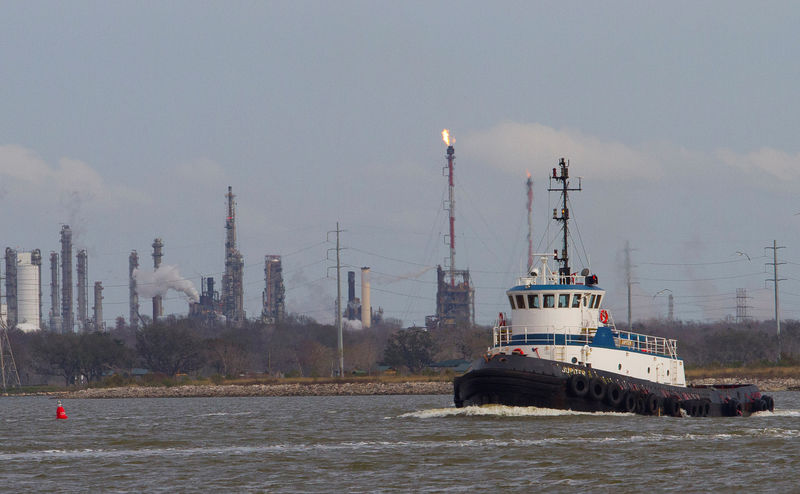By Collin Eaton (NYSE:ETN)
HOUSTON (Reuters) - Fines for violations of air, water and waste regulations by U.S. petroleum storage facilities so far this year have exceeded all of last year - even without including two major Houston-area disasters in the last month still under investigation - according to a Reuters analysis of federal data.
Federal and state fines of storage-tank operators totaled $5.2 million as of April, from $4.1 million for all of 2018 and $2.5 million in 2017, according to data on federal and state penalties analyzed by Reuters from the U.S. Environmental Protection Agency.
U.S. petroleum storage operators have added millions of barrels of capacity since 2015 when the United States lifted a 40-year ban on crude exports.
The nation is now shipping as much as 3.6 million barrels per day (bpd) overseas, and cheap natural gas prices have fueled a boom in petrochemical production that also necessitates more storage, particularly on the U.S. Gulf Coast. With that, however, have been more air and water quality incidents.
"There have been some accidents and an awful lot of expansion," said Eric Schaeffer, executive director of nonprofit Environmental Integrity Project and a former director of civil enforcement at the EPA. "There's been a drop in resources available for enforcement. There have been mixed signals on how much enforcement to do."
Graphic: U.S. environmental penalties grow amid disasters, click https://tmsnrt.rs/2GKWfez
This year, the average penalty is $218,000, up from $52,000 in 2018. The total number of actions for violations of Clean Air and Clean Water Act regulations was 24, up from 17 by this time last year, the data showed.
That figure does not include two incidents in Texas for which federal and state investigations are underway, but no fines have yet been assessed.
A March fire at a Houston-area petrochemical storage facility raged for days, sending millions of pounds of carbon monoxide and other gases into the air, and leaking thousands of gallons of fuel and toxic foam into waterways.
The blaze at a site along the Houston Ship Channel in Deer Park, Texas, started when a leak from a tank containing volatile naphtha ignited and spread to others in the same complex. Those tanks hold tens of thousands of barrels of products used to boost gasoline octane, and make solvents and plastics.
Weeks later, a blast and fire at a separate plant north of Houston that makes an aviation fuel component killed one worker and injured two others.
Graphic: U.S. crude storage operators expand amid oil boom, click https://tmsnrt.rs/2GLxvCQ
Crude storage capacity is up 17 percent across the nation to 573.6 million barrels since 2015, according to the U.S. Energy Information Administration.
Companies including LBC Tank Terminals and Moda Midstream LLC are among those expanding to handle the growing U.S. crude exports.
Operators are expanding 23 storage terminals in Texas and seven in Louisiana, according to market data provider TankTerminals. Texas terminal operators are projected to boost capacity 7 percent by the end of 2019 to 393 million barrels, TankTerminals data shows.

Graphic: U.S. Gulf Coast petroleum storage capacity grows in energy boom, click https://tmsnrt.rs/2WgIAks